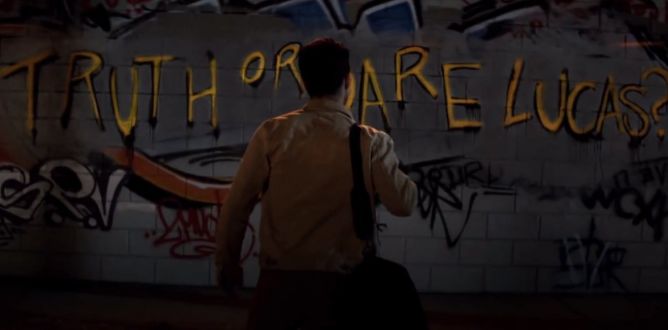Truth or Dare Parent Guide
The script is just an excuse to portray suicides, violence and sex because "the devil made me do it!"
Parent Movie Review
Playing a game of “Truth or Dare” during spring break (does anything good ever happen in movies during spring break?) a group of friends end up in a deadly exchange that is blamed on a spiritual force. In reality, the script is just an excuse to portray suicides, violence and sex because “the devil made me do it!”. And although the cast depicts “college students”, the film is a heat seeking missile targeting teens with characters who act like middle-schoolers and are played by photogenic TV stars many adults won’t recognize.
Olivia (Lucy Hale) is a nice, responsible and smart brunette. To prove she’s not worthy of the horrors to come, she’s set on volunteering for Habitat for Humanity during her week off. But her besty, a blonde named Markie (Violett Beane—who had to bleach her hair to follow the color coding stereotype), is her live-for-the-moment, shoulder devil. After insisting Olivia must, must come with her to Mexico for the holiday, she even paves the way by somehow canceling Olivia’s commitment to the charity.
Is that what friends are for?
With the rest of her buds waiting impatiently in the car, Olivia makes like a lemming and follows them south. We already know many of the members of this crew are “throwaways,” to be picked off one-by-one by the evil antagonist. The exception is Markie’s crush Lucas (Tyler Posey), who is obviously about to become the wedge between these young ladies.
The plot starts with a drunken pub night. Olivia shuns the stupidity of her friends and meets a more serious stranger sitting alone at the bar. Carter (Landon Liboiron) is soooo nice and sensible it’s no wonder Oliva bites hook, line and sinker when he suggests they take this party elsewhere. With the gang in tow, they head into the Mexican night, cut through a fence with a big warning sign in Spanish (which should have been an obvious no-go) and wander into a crumbling old monastery. And now, says Carter, let’s play “Truth or Dare.”
Of course the game is going to have drastic real-world consequences, and the challenges are not controlled by the participants. Instead an evil spirit overtakes each player and all are forced to take a turn. Truths involve deeply personal and emotional revelations, and dares are a combination of highly dangerous, illegal, sexual and violent actions.
Using the typically malevolent game, the story creates scenarios that would be unthinkable in any other circumstance. Physical harm toward others, self-inflicted wounds and deaths are had with guns, knives and other objects. Audiences with sensitivities for portrayals of suicide should be especially cautious.
Characters are forced to have sex (which we see in more detail than necessary – including some brief female side nudity), streak (rear male nudity) and make out together (a “bi-curious” female with a non-willing female). Added to this are other sexual discussions with a penchant toward non-committal relationships involving all genders.
Perhaps the best message we can extract from Truth or Dare is its exploration of honesty between friends. Yet you can find similar messages in far better media than this excuse for teen entertainment.
Directed by Jeff Wadlow. Starring Lucy Hale, Tyler Posey, Violett Beane. Running time: 100 minutes. Theatrical release April 13, 2018. Updated July 17, 2018
Truth or Dare
Rating & Content Info
Why is Truth or Dare rated PG-13? Truth or Dare is rated PG-13 by the MPAA for violence and disturbing content, alcohol abuse, some sexuality, language and thematic material.
Violence: Young men and women challenge one another to complete “dares” that are often violent and include shooting or physically harming each other/themselves. A woman with emotional problems is seen holding a gun pointed at her face and debating killing herself. Another character discusses the suicide of a close relative. Another commits suicide with a gun. A character commits suicide by stabbing an object into his head. A character accidentally dies after falling on an object. A character holds a gun pointed at a parent and asks him to beg for his life. In response to a dare, a woman walks into a small store, douses a stranger in lighter fluid and sets the person on fire. A character’s opens mouth reveals the tongue has been cut out. Another character is forced to use a knife to cut out their own tongue. A woman recounts an episode of sexual abuse. A character drinks a large bottle of hard liquor while attempting the dare of walking on the edge of a roof. Some scenes include limited depictions of blood.
Sexual Content: A man and woman are “forced” to have sex due to a dare: we see them undress (quite happily) and get into bed, followed by more sexual activity (she is on top of him), and a brief moment of side breast nudity. A man, in response to a dare, streaks through a darkened room: brief rear nudity is seen, along with hearing remarks about his “size”. A man, in response to a truth, admits he finds another man in the room attractive. Later this same character is dared to reveal his sexual orientation to a close family member. Other discussions include topics of sexual orientation, gender curiosity and sexual abuse. Women are seen in bikinis and other revealing clothing.
Profanity: A single sexual expletive, a few scatological terms, slang anatomical words and crude terms for sex are heard.
Alcohol / Drug Use: Characters drink heavily in a bar scene. A character drinks a large bottle of hard liquor while walking on the edge of a high rooftop.
Page last updated July 17, 2018
Truth or Dare Parents' Guide
Can the game Truth or Dare ever be played with positive outcomes? What is the difference between lying and keeping confidences/opinions to ourselves? Is the term "truth" twisted in this scenario? Why are people usually dared to do something harmful? Are there better ways to encourage someone to try something new that will provide a positive experience? Who has the right to tell you what to do?
Suicidal portrayals in media can be dangerous for those who are at risk. This post on Psychology Today lists elements that should be included in any media portrayal of suicide, such as "a story of a survivor who is living proof that the suicidal state can be temporary and that ... it gets better." In addition it recommends any discussion of suicide should provide "resources for people who may be in crisis or worried about someone they know". Does this movie offer any of these things? Does this movie glamorize or sensationalize suicide?
News About "Truth or Dare"
This movie is also known as Blumhouse's Truth or Dare.
Home Video
The most recent home video release of Truth or Dare movie is July 17, 2018. Here are some details…
Truth or Dare releases to home video (Blu-ray/DVD/Digital) with the following extras:
- Theatrical Version
- Unrated Director’s Cut.
- Game On: The Making of Truth or Dare
- Directing the Deaths
- Feature Commentary with Co-Writer/Director Jeff Wadlow and Actress Lucy Hale


